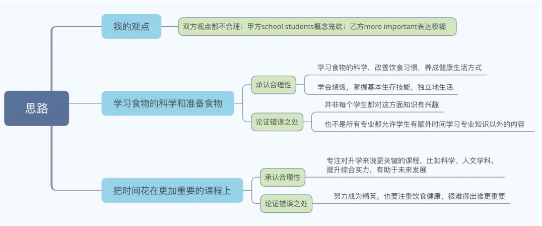雅思大作文7分范文及解析:学生应该学习饮食知识和做饭
作者:小朗老师来源:朗阁教育时间:2021-03-22 13:51:42
摘要:石家庄朗阁教育给大家分享的雅思写作范文是什么呢?如果你想要了解那么赶紧来这里看看详情吧。
双边类大作文,教育类话题
Some people think school students should learn the science of food and how to prepare it, others think students should spend time on other more important subjects. Discuss both views and give your own opinion.
题目来源:2021年1月16日亚太雅思大作文
题目大意
有人认为学生应该学习食物的科学,和如何准备食物。其他人认为学生应该把时间花在其他更重要的课程上。讨论双边并给出你的观点。
思路解析
这是一道双边讨论类的题目,可以自由讨论双方各自的利弊。这道题目中的两个观点,都有不合理性,甲方观点错误在于“school students”是一个笼统宽泛的概念;乙方观点错误在于 “more important”表达模糊,无法用理性方式论证得出“谁才更加重要”。下面我们就具体梳理下两方观点的合理与不合理。
甲方认为“学生应该学习食物的科学,和如何准备食物”,这个观点有合理性:
首先学习食物的科学,可以改善学生的饮食习惯,养成更加健康的生活方式。现在生活便利了,点外卖几分钟搞定,学生吃各种快餐和零食、喝各类奶茶的频率越来越高。那么通过学习均衡膳食、营养配比等相关知识,了解过度摄入糖分、脂肪和盐分的危害,能够帮助学生养成少吃垃圾食品的习惯,从而生活得更加健康。
其次,学会如何准备食物 or 做饭可以让学生在未来更加独立地生活,甚至部分学生也可能以此作为谋生的职业。
但是,甲方观点错误的方面在于:要求所有学生都去学习食物的科学或如何准备食物不现实,因为并不是所有学生都对这方面的知识有兴趣 or 不是所有专业都有时间让学生去学习与专业知识无关的内容。
下面看看乙方的观点,乙方认为“学生应该把时间花在其他更重要的课程上”,先承认乙方观点的合理性:学生应该学习对自己未来发展有利的课程,比如数学、物理、化学或者人文学科,掌握了这些基础知识,才能更好地为个人发展打下基础,不管是求职还是继续深造*都更加有竞争力。
而乙方观点不合理的方面在于:学生努力成为精英,也不能不注重饮食健康,也要健康地生活,很难得出“谁才是更加重要的课程”的结论。
提纲
*范文示例
It is often argued that students are supposed to learn scientific facts and principles of food as well as how to prepare meals. While others disagree and believe that the limited time should be allocated to other courses like science and liberal arts, which are of greater significance to the younger generation. It looks to me that neither of the two views is justified enough to illustrate the whole picture.
On the one hand, I reckon that acquiring the scientific knowledge associated with multiple facets of the food system has some favourable impacts on the younger generation. To be specific, if students are able to bear in mind what the best nutrient ratio for a balanced diet is or gain an in-depth understanding of the dangers of excessive intake of sugar, saturated fat and salt, they tend to avoid falling into an addictive junk food trap in which plenty of teenagers are suffering from severe health problems such as obesity and hypertension. Furthermore, mastering cooking skills helps students equipped with essential capabilities to survive and live more independently in the future. Nevertheless, it is unrealistic to oblige all the school students to pick up the science of food since some of them may not be interested in this field. In addition, not all the courses are able to allow students extra time for familiarising themselves with the contents beyond professional knowledge.
On the other hand, opponents claim that those young learners should prioritize other compulsory subjects crucial for progress to higher education. Through mastering the fundamentals in courses such as physics, chemistry and history, these school attendants are more likely to become well-rounded talents so as to prepare themselves better for further studies, which is destined to play an indispensable role in their career development. Unfortunately, it does not make sense to me that such so-called required subjects eclipse the knowledge from other aspects for insisting on a healthy diet is of equal importance to endeavours to be elites. In this way, it is hard to make a judgement about which subjects should be of greater value.
In conclusion, I hold that both arguments make certain mistakes. Demanding all the students to have access to the science of food cannot be justified and there is no objective criterion to determine which subject is more important.
-
-

-
全真测评
入学测评 阶段测评
-
-
-

-
科学体系
智能词汇 专项题库
-
-
-

-
学习督导
全程监督 引导学习
-
-
-

-
品牌优势
教师护航 学习无忧
-
沪ICP备17003234号 版权所有:上海朗阁教育科技股份有限公司
总部地址:上海市黄浦区淮海中路222号力宝广场5楼
Copyright 2005 LONGRE EDUCATION GROUP All Rights Reserved

 400-8766-190
400-8766-190



